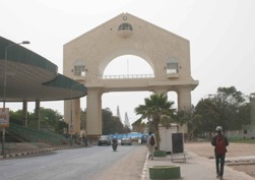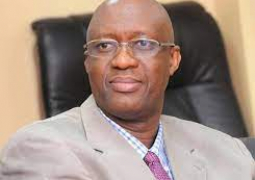
While general price movement or inflation has gone up a bit in the past three months, food inflation slightly reduced in October 2024, said CBG Governor Buah Saidy, in delivering the bank’s final Monetary Policy Committee report for 2024.
Presenting a statement of the report at a press briefing held yesterday at the CBG, Governor Saidy said: “On domestic price developments, inflation edged up slightly over thepast three months, reversing the declining trend observed in the previous six months. Headline inflation stood at 10.0 percent in October2024, unchanged from September but higher than 9.8 percent inAugust. Nonetheless, Staff forecast suggests that headline inflation will eventually decline back to single digits by the first quarter of 2025, barring any further surprises in international commodity prices.”
He also said: “Food inflation slightly decelerated to 12.8 percent in October 2024, from 13.0 percent in July 2024. The easing of food inflation reflects moderation in major components in the food basket, including the price indices of meat, milk, cheese and eggs, fruits and nuts, vegetables, and sugar, which offsets the increase in the prices of bread and cereals, fish and oil and fats. On the other hand, non-food inflation marginally rose to 6.6 percent in the review period, from 6.3 percent reported in September 2024, on account of rising energy costs, particularly firewood, within the housing, water, electricity, and gas categories.”
Furthermore, he stated, the Bank’s core inflation measure, which excludes volatile food and energy prices, has also “shown modest increases” in recent months.
Core inflation, which excludes volatile energy and food products, rose to 3.5 percent in October, from 3.1 percent in September2024, he said.
While significant progress has been made in reducing inflation during the first half of 2024, Governor Saidy intimated that recent trends highlight emerging risks, adding that persistent short-term pressures, particularly in essential goods and services like housing and food, global oil price volatility, and domestic structural bottlenecks continue to challenge the inflation outlook.
“However,” he presumed, “the Committee expects these developments to be temporary, with inflation projected to decline back to single digits by the first half of next year.”
He added: “The recent uptick in inflation and its projected persistence, as indicated by the latest forecast, necessitate the commitment to maintaining a policy stance that ensures inflation returns to the medium-term target of 5.0 percent.”
In view of the above, the Governor said, the Committee decided to maintain the Monetary Policy Rate (MPR) at 17percent and the Required Reserve (RR) ratio of commercial banks at 13percent.
The Committee, however, decided that the interest rate on standing deposit facility will be increased by 1 percent to 4 percent, from the 3 per cent it was in the last three months.
The interest rate on the standing lending facility will remain at 18.0percent or MPR plus 1.0 percentage points, he added.
Fighting hard to curb inflation, “the Bank will intensify the use of CBG bills” to mop up excess liquidity in the system, the Governor suggested, saying: “The Committee will continue to monitor developments in both the domestic and global economy in deciding its next policy steps.”
Governor Saidy said economic activity in the Gambia was strong in the third quarter of 2024 and the medium-term outlook “remains favorable”.
While the exchange rate of the dalasi “remains relatively stable”, with slight depreciation against the US dollar, the Euro, the British pound sterling and the CFA, the Governor said: “The Central Bank continues to hold comfortable levels of international reserves, amounting to US$460 million in October 2024, which is sufficient to finance over 4.6 months of prospective imports of goods and services.”





